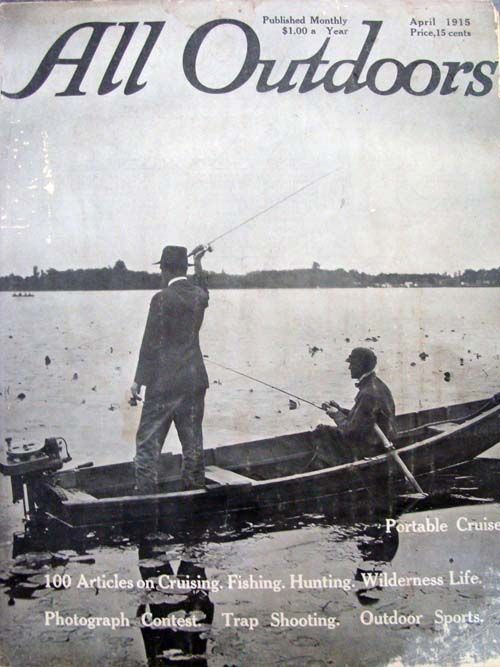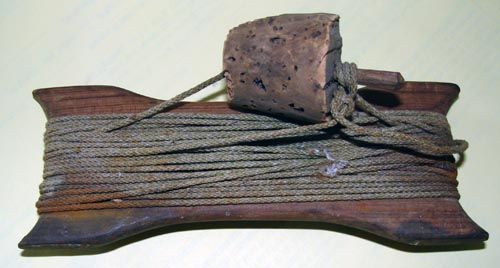Crisco – Helps catch fish as well as fry them!
There is no end to the surprises that await one on the pages of old “outdoor magazines”. Those surprises are not always in the form of ads. I recently purchased an April, 1915 issue of a somewhat obscure magazine entitled ALL OUTDOORS.Two things caught my eye right away. First, was the size of the magazine being 13 x 10 inches it would not fit on my scanner. Second, is the remarkable cover photo of two men fishing in a boat with a vintage outboard. The sharp focus and detail in the photo is really amazing.

When one looks through a large selection of pre-World War One outdoor magazines it quickly becomes obvious that much of the content is contributed by the readers. Discussions on fishing, hunting, sporting ethics, etc, run month to month and in many ways are the precursor to today's Internet chat boards. There are usually plenty of “hints” and suggestions (often referred to as “kinks”) from readers. I am always impressed with the frugality of the times and the need to “make do” with what one had in the way of fishing tackle. Again and again one sees plans submitted on how to make a serviceable tackle box from an empty cigar box. When turn-of-the-century tackle was still regularly found, the lack of sophisticated tackle was often in evidence. I kept the item pictured below, to remind myself how really simple the sport of fishing could be for the average person 100 or more years ago. The line is braided linen and is equipped with a hook, a sinker and a cork fashioned in to a bobber. One only needed a can of worms and a knife to cut a pole upon arriving at the fishing destination. When viewed in this light, a tackle box made from a cigar box with a couple of plugs and a spinner seems fairly sophisticated.

The following suggestion was found in this particular magazine and was reason enough for me to research a short history of Crisco. The product was originally made from cotton seed oil and was first advertised in 1912. It was an immediate success due to a shortage of animal fat during World War I. With the lack of refrigeration at that time, its staying power on the shelf was also a big selling feature. I'm sure the makers if Crisco did not envision the use advocated by this gentleman from Chicago in the following letter to the editor.
Oil for Bass-Plugs
Editor All Outdoors; I have been very much interested in All Outdoors for long but doubly so since its becoming a monthly publication. Following is an item for you that may interest fishermen and especially bait casters. Not intended as any special “ad” for the article mentioned, but I have found that Crisco, the new odorless cooking fat that does not become rancid, is a most excellent casting line grease. Rub some into a clean flannel rag and go over the line while still hung out after drying. This vegetable fat does not appear to decompose. It is saltless, odorless and invisible after applying to the line.
Also, ye members of the brotherhood who are bothered by your bass-plugs and artificial minnows cracking, when you have well dried a minnow that is beginning to check, rub Crisco into the cracks and abrasions in the enamel and apply a little dressing of it over the lure, hooks and all, and halt disintegration. In this manner many a plug may be preserved for a long and useful life. L.L. P., Chicago, Ill.
-- Bill Sonnett
No comments:
Post a Comment